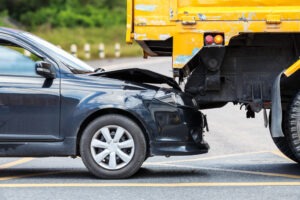
In Ohio, you can file a claim for a Columbus truck accident lawyer even if you were partially at fault. Ohio follows a comparative negligence rule, which allows you to file a claim and recover compensation even if you were partly responsible for the crash and any resulting damages. However, you cannot recover compensation if you are more than 50 percent at fault.
How Do Insurance Companies and Personal Injury Lawyers Determine Fault for a Truck Accident?
If your truck accident was 100 percent someone else’s fault, you could file a personal injury claim and potentially recover 100 percent of your deserved compensation settlement. However, if you were, for example, 20 percent at fault, you could only receive 80 percent of your awarded settlement or judgment, per Ohio Revised Code § 2315.33. If you are more than 50 percent at fault, you cannot recover any compensation.
If your insurer and the trucking company’s insurer cannot agree on who was at fault or how much fault each party bears, the insurance adjusters will examine the evidence to assign percentages of fault to each liable party.
It’s a good idea to speak with a truck accident lawyer shortly after your accident to help you determine fault for the collision. They can perform an independent investigation to determine fault and negotiate with the insurance companies on your behalf. Your truck accident attorney will help you fight for the compensation you deserve to cover your accident-related damages.
How to Prove Negligence in a Truck Crash
Your personal injury lawyer can gather evidence to help prove fault in your truck collision. Such evidence may include:
- The police report from the accident
- Your medical records
- Videos or photos of the crash or accident scene
- The truck’s black box recording
- Eyewitness statements
In a truck accident, negligence often occurs when a truck driver does not act reasonably to avoid harming others. You must prove the following four things to meet the legal definition of negligence:
- Duty of care: The driver had a duty to other motorists to operate a truck or other motor vehicle safely and with care.
- Breach of duty: The driver breached their duty by acting or not acting in the way another reasonable driver would have to avoid harming another. For instance, a negligent driver might breach their duty of care by choosing to speed or drive while under the influence of alcohol or drugs.
- Causation: The driver’s negligent actions or inactions caused an accident.
- Damages: Other drivers or passengers involved in the accident suffered injuries or other damages.
More than one driver can contribute to an accident. For example, if a truck driver runs a red light and T-bones a passenger car in an intersection, the truck driver may be mostly at fault. However, if the passenger car driver illegally changed lanes in the intersection or disobeyed another traffic law, they may be found partially at fault.
Each accident is unique. Careful investigation is required to indicate what led to your accident and where the fault lies.
Determining Liability for a Truck Accident
When you’re in an accident with a big rig truck, it may seem obvious to you that liability lies with the truck driver. However, legal liability can be complicated. There are multiple potentially liable entities or individuals when a commercial truck is involved in a collision, such as:
- The truck driver. A negligent truck driver may cause an accident if they’re driving while intoxicated, talking on the phone, or distracted.
- The trucking company that employs the driver. If the driver was performing their work duties when the crash occurred, their employer may be automatically liable due to a legal principle called respondeat superior. Additionally, the trucking company may not have provided adequate training or may have required the driver to stay on the road beyond the legal time limit, causing the driver to be impaired from exhaustion.
- Truck or truck parts manufacturers. If a manufacturer used substandard or improperly installed materials, they may have caused the truck to malfunction.
- Maintenance crews. Those tasked with maintaining the truck may have slacked in their duty by not performing regularly scheduled maintenance or by performing maintenance in a slipshod manner.
- Cargo loaders. If the cargo is not loaded into an 18-wheeler truck safely and correctly, it can shift and throw the truck off balance, causing an accident.
Untangling liability and fault for a big rig accident takes time and resources. Meeting with a personal injury lawyer experienced in federal and state trucking laws may go a long way toward setting you on the right path for a fair compensation settlement or judgment.
Types of Damages You May Receive From Your Truck Accident Claim
Types of damages you may collect after a truck accident may include but aren’t limited to:
- Medical bills
- Out-of-pocket costs such as co-pays, deductibles, or childcare
- Property damage to your vehicle or personal property in your vehicle at the time of the accident
- Lost income and loss of future earnings
- Pain and suffering
- Loss of quality of life
- Mental and emotional anguish
We Will Be
There To Help
You All The Way
The Fitch Law Firm LLC’s Truck Accident Attorneys Are Here When You Need Us
Our truck accident attorneys are passionate about protecting your rights and helping you get the justice you deserve. Reach out anytime, 24/7, to connect with one of our team members for a free consultation. We want to listen to your story and provide our best advice.
We are upfront about fees and costs—no financial surprises await you. If we represent you, we will do so on a contingency fee basis. If we do not help you recover compensation, you will pay no legal fees. It’s that simple. Contact us online or give us a call today. We’re here for you.
